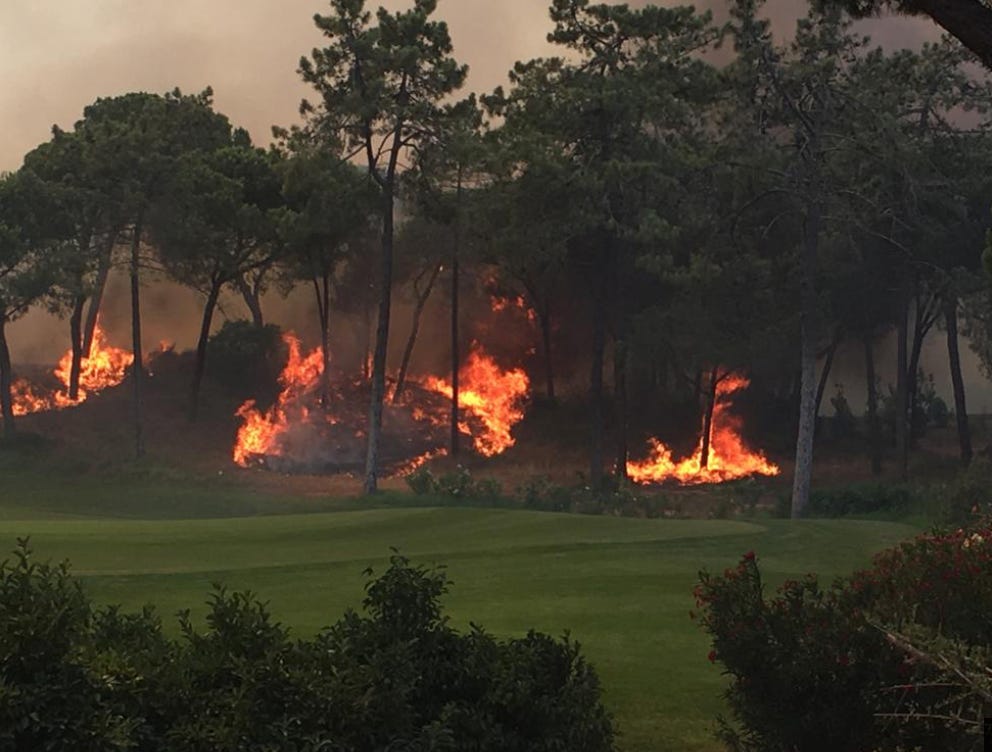When we lived in California I pledged that if we ever moved our next locale would not have earthquakes, wildfires, or extreme heat events. Then we moved to Portugal…
Three for Three
It was not until we had moved to Portugal, and I started researching its history for this blog, that I realized that Portugal has earthquakes. (Okay, stop shaking your head…as I have explained before we don’t do a lot of research in advance.) Fortunately, the last “big one” was in 1755 destroying much of Lisbon and many parts of Algarve (including VRSA). However, some say that the “big ones” occur every 250 years. If this is so, we are overdue. Not at all overdue is the Azores which registered 1100 small tremors in April causing local authorities to consider a “seismic crisis”.
Last summer, when we lived in Cascais, we never had a need to put on the air conditioning. And while May and June were very mild this year in VRSA, July announced: “summer is here”! The first weekend in July the temperature went above 90 degrees Fahrenheit, (30 degrees Celcius) and has stayed close to the mark since.
Last week, Denise and I drove across the toll road to Albufeira to play in a golf tournament. As we drove, we saw several large plumes of black smoke off in the distance. When we arrived in Albufeira we learned the sad news that the golf community at Quinta do Lago was on fire.
91% Agree
As I wrote before, 91% of the Portuguese population agrees there is a climate crisis. Moreover, 85% support stronger government measures that force people to change their behavior, and 77% or willing to pay higher taxes on products and services that contribute to global warming. Looking at the map above, it is easy to see why.
As I write this post there are nearly 2500 firefighters fighting 27 fires across Portugal. The fires extend from Aveiro to Algarve (including Loulé and Faro). This morning I opened my email to find that a fellow American living near Setúbal, nearly lost her home in the Palmela fire (I recommend you read her first-hand account).

“Noble in Peace, Heroes in Adversity”
The first organized Portuguese firefighters were established in Lisbon in 1390 when D. John I said:
"...in case if any fire rises, which God did not want, that all the carpenters and caulds come to that place, each with his axe, to cut down the said fire. And may all the women who light up the said fire, each bring their pitcher or pot to bring water to put out the said fire."
In the 16th century, Porto assigned personnel to insure that residents turned off their kitchen fires at night. In the mid-17th century, organization and resources were added including warehouses to store firefighting equipment. Advancements in equipment and firefighting techniques continued, and in 1880 Portugal recognized the Associação de Bombeiros Voluntários (Volunteer Firefighters Association).
Today, 90% of Portugal’s 30,000 firefighters are volunteers. They are called bombeiros which roughly translates to “people who pump”. These “heroes without capes” must complete 350 hours of training and commit to leaving their jobs when a disaster occurs. In addition, annually, bombeiros must complete an additional 40 hours of training. Of course, the bombeiros assist when there is a flood, a serious car accident, or to recover a cat from a tree. But it is at this time of year that their incredible service is most evident.
NB: I took the title of this post from Jorge Branco’s excellent newsletter. If you want to stay up-to-date on Portuguese news in English, I recommend you subscribe. “On Wednesday alone 171 fires started, an average of more than one every 10 minutes, as strong winds combined with drought-hit land and temperatures above 45 degrees in parts, Público reports.”
Next Week: to the victor go the spoils and let’s talk about mental health.







This is a good blog. If the bombeiros are in need of men I will get involved. Once I get to an intermediate level of Portuguese that is. Thanks for the inspiration.
What goes around comes around. So often, when we make a bold move to escape a perceived crisis, we are met with an authentic crisis - far worse than the one perceived. To engage in living is to experience crises - real and imagined. My ex-husband expressed it in terms of used cars - "You trade a leak for a squeak."